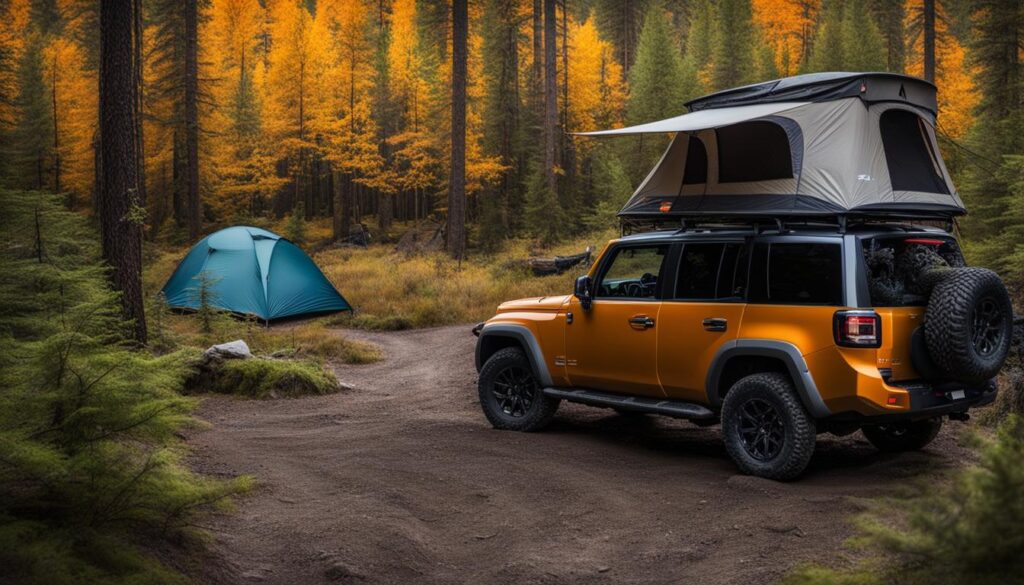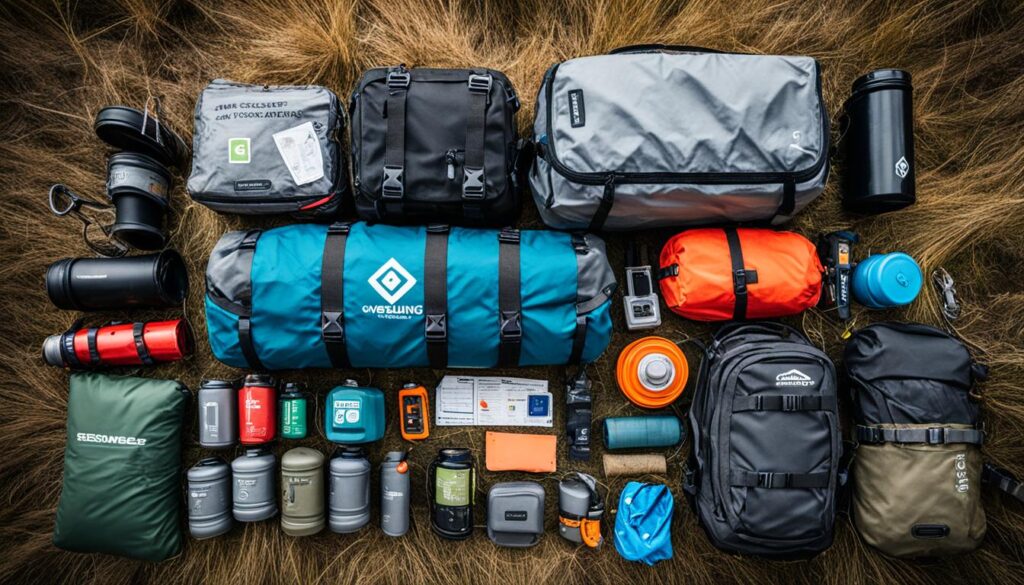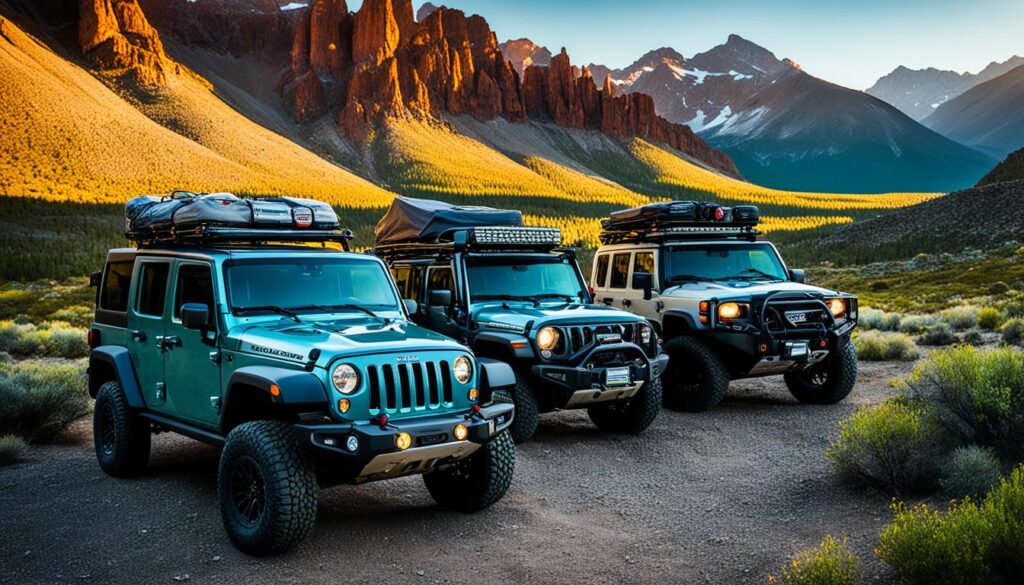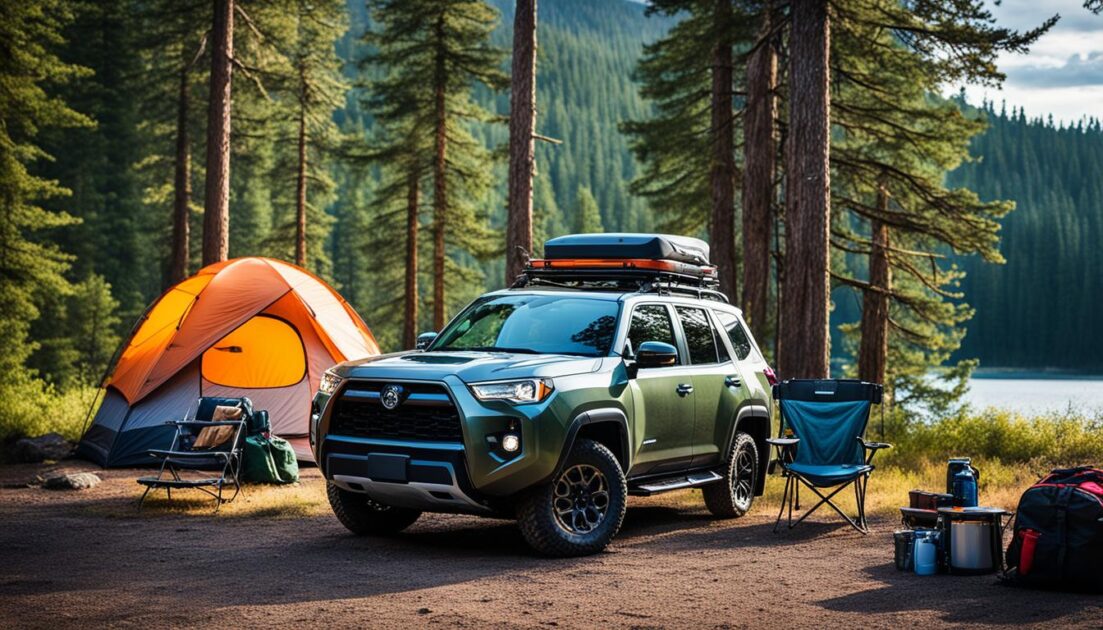Are you ready to embark on an extraordinary camping experience that combines the thrill of off-roading with the serenity of sleeping under the stars? Look no further than overlanding camping. This unique adventure takes you on a journey into remote locations, allowing you to explore untouched wilderness and create lasting memories.
Overlanding camping is all about the journey, not just the destination. It’s a perfect blend of camping and off-roading, where you get to immerse yourself in nature while conquering challenging terrains. But before you hit the road, it’s important to understand what overlanding camping is all about and how to make the most of this one-of-a-kind adventure.
Key Takeaways:
- Overlanding camping combines camping and off-roading for a unique adventure.
- The emphasis is on the journey, allowing you to explore remote and untouched locations.
- Proper research, planning, and a well-equipped vehicle are essential for a successful overlanding camping trip.
- Overlanding is different from traditional camping as it focuses more on self-reliance and traveling off the beaten path.
- Choosing the right gear and vehicle is crucial for a comfortable and enjoyable overlanding camping experience.
The Difference Between Overlanding and Camping
While overlanding and camping share similarities, there are some key differences between the two. Camping focuses on staying at a specific destination and enjoying outdoor activities, while overlanding is more about the journey itself. Overlanding involves self-reliance and traveling to remote locations off the beaten path. It requires a sense of adventure and the ability to navigate through challenging terrains.
Camping is often associated with setting up tents at designated campsites, cooking meals over a campfire, and engaging in activities such as hiking, fishing, or relaxing in nature. It provides an opportunity to reconnect with the outdoors and enjoy a simpler way of living for a short duration.
On the other hand, overlanding encompasses the spirit of expedition and exploration. It involves traveling long distances, often crossing borders or heading into remote and untouched regions. Overlanding enthusiasts typically drive off-road vehicles equipped with camping gear and supplies to sustain them for extended periods.
Overlanding requires careful planning and consideration of various factors such as navigation, communication, and vehicle capabilities. It is an adventure that pushes individuals to step out of their comfort zones and embrace the unknown.
Overlanding is not just about camping—it’s a way of life, a desire to explore, and a passion for new experiences. It’s about venturing into the wild and immersing oneself in the beauty and challenges of nature.
To summarize the differences between overlanding and camping:
| Overlanding | Camping |
|---|---|
| Emphasis on the journey | Focus on a specific destination |
| Traveling to remote locations | Staying at designated campsites |
| Self-reliance | Reliance on established facilities |
| Navigating challenging terrains | Enjoying outdoor activities |

Essential Gear for Overlanding Camping
When embarking on an overlanding camping trip, it’s crucial to have the right gear to ensure a safe and comfortable adventure. Here is a list of essential gear that every overlander should consider:
1. First Aid Kit
An overlanding camping journey can take you to remote areas with limited access to medical facilities. A well-stocked first aid kit is essential for treating minor injuries and providing immediate care in case of emergencies.
2. Emergency Communication Device
To stay connected and summon help when needed, it’s important to carry an emergency communication device such as a satellite phone or a two-way radio. These devices can be a lifeline in case of emergencies or when you’re out of range for standard cellular service.
3. Vehicle Recovery Kit
When traveling off-road, there is always a chance of getting stuck. A vehicle recovery kit, including a kinetic recovery rope, shackles, and a shovel, can help you get your vehicle unstuck and back on track.
4. Basic Tools
Carrying a set of basic tools is essential for performing minor repairs and maintenance on your vehicle during your overlanding adventure. This includes items such as a wrench set, pliers, screwdrivers, and a tire pressure gauge.
5. Tire Repair Kit
Flat tires are a common occurrence during off-road journeys. Having a tire repair kit, including a tire plug kit, tire inflator, and spare tire, can help you quickly fix a puncture and continue your journey.
6. Water and Water Filtration System
Access to clean drinking water is crucial when camping in remote locations. Pack enough water for your trip and consider carrying a water filtration system to ensure a continuous supply of safe drinking water.
7. Cooking Tools and Stove
A portable cooking stove and a set of cooking tools are essential for preparing meals during your overlanding camping trip. Opt for lightweight and compact cooking gear that is suitable for outdoor use.
8. Well-Equipped Sleep System
Getting a good night’s sleep is vital for enjoying your overlanding camping adventure. Invest in a high-quality sleep system, including a comfortable sleeping bag, sleeping pad, and a reliable tent or rooftop tent.
9. Weather-Appropriate Clothing
Pack weather-appropriate clothing, including layers, to protect yourself from varying weather conditions during your overlanding camping trip. Be prepared for temperature fluctuations and sudden changes in weather.
10. Power Supply
Having a reliable power supply is essential for charging your devices, running your electronics, and maintaining communication. Consider portable solar panels or a power bank to keep your devices powered up.
11. Weight Capacity Considerations
When packing your gear, be mindful of the weight capacity of your vehicle. Distribute the weight evenly and avoid overloading your vehicle, as it can affect its performance and safety.
Properly equipping yourself with these essential gear items will ensure that your overlanding camping trip is safe, enjoyable, and memorable.
| Essential Gear | Description |
|---|---|
| First Aid Kit | A well-stocked kit for treating injuries and emergencies. |
| Emergency Communication Device | A satellite phone or two-way radio for staying connected. |
| Vehicle Recovery Kit | Tools for getting your vehicle unstuck during off-roading. |
| Basic Tools | Tools for performing minor repairs on your vehicle. |
| Tire Repair Kit | Tools for fixing flat tires quickly on the go. |
| Water and Water Filtration System | Supplies of water and a system to filter and purify water. |
| Cooking Tools and Stove | Portable cooking gear for preparing meals. |
| Well-Equipped Sleep System | Comfortable sleeping gear for a restful night. |
| Weather-Appropriate Clothing | Proper clothing for various weather conditions. |
| Power Supply | Portable power source for charging devices. |
| Weight Capacity Considerations | Be mindful of vehicle weight capacity when packing. |

Choosing the Right Vehicle for Overlanding Camping
The choice of vehicle is crucial for a successful overlanding camping trip. When venturing into remote and off-road locations, it’s important to have a reliable and capable vehicle that can handle the challenges of the terrain. Here are some factors to consider when selecting the best vehicle for overlanding camping:
- Four-Wheel Drive: Opt for a vehicle with four-wheel drive capabilities, as it provides better traction and maneuverability on various terrains. It will enable you to tackle obstacles and navigate through challenging conditions effectively.
- Off-Road Tires: Equip your vehicle with quality tires specifically designed for off-roading. These tires offer improved grip and durability, ensuring optimal performance on rugged paths and uneven surfaces.
- Suspension: Consider a vehicle with a robust suspension system that can handle the additional weight of your camping gear and maintain stability on bumpy terrains. Upgraded shock absorbers and springs can provide a smoother and more comfortable ride.
- Gearing: Look for a vehicle with a low-range gearbox, which provides increased torque and control for navigating steep inclines and descents. It allows you to maintain a steady speed and power through challenging obstacles without straining the engine.
- Capacity and Weight: Choose a vehicle with adequate cargo capacity and weight-carrying capabilities. Ensure it can accommodate all your camping essentials without compromising on performance or safety.
- Protection: Consider vehicles with added protection features such as skid plates, rock sliders, and bull bars. These additions can safeguard your vehicle’s vulnerable parts from potential damage during off-road adventures.
Popular Vehicles for Overlanding Camping
Several vehicles have gained popularity among overlanding campers for their reliability, off-road capabilities, and spacious interiors. Here are some of the top choices:
| Brand | Model |
|---|---|
| Ford | F-150 |
| Toyota | Tacoma |
| Jeep | Wrangler Rubicon |
| Land Rover | Defender 110 SE |

Choose a vehicle that aligns with your specific needs, preferences, and budget. Conduct thorough research and consider taking test drives to ensure the chosen vehicle meets your expectations and requirements. Remember, having the right vehicle sets the foundation for an unforgettable overlanding camping adventure.
Planning an Overlanding Camping Trip
Before embarking on an overlanding camping trip, proper planning is crucial. Taking the time to prepare and organize can make all the difference in ensuring a smooth and enjoyable adventure. Here are some essential tips and tricks to help you plan your overlanding camping trip:
Research and Choose Your Route
Start by researching different routes and destinations that align with your preferences and level of experience. Consider factors such as weather conditions, road accessibility, and available camping sites along the way. Look for scenic views, points of interest, and off-the-beaten-path locations to enhance your overlanding experience.
Download Your Vehicle’s Manual
Make sure to download your vehicle’s manual to your phone or tablet for easy access during your trip. This will come in handy for troubleshooting any unexpected issues that may arise on the road.
Share Your Plans
It’s important to share your travel plans with a trusted friend or family member. Let them know your intended route, estimated timeline, and expected return date. In case of any emergencies or unforeseen circumstances, having someone aware of your itinerary can provide an added layer of safety.
Familiarize Yourself with Leave No Trace Principles
When overlanding and camping in natural environments, it’s crucial to minimize your impact on the surroundings. Familiarize yourself with the Leave No Trace principles, which include practices like packing out your trash, staying on designated trails, and respecting wildlife and vegetation. Leave the places you visit as pristine as you found them.
Carry a Paper Map
While digital maps and navigation systems are convenient, it’s always wise to carry a paper map as a backup. Technology can fail, and having a physical map ensures you won’t get lost in case of a GPS malfunction or loss of signal.
Organize Your Gear
To make your overlanding camping trip more efficient, organize your gear in a way that allows for easy access and organization. Consider using storage boxes or bags labeled with different categories, such as cooking utensils, camping essentials, and personal items. This will save you time and frustration when setting up your campsite or searching for specific items.
By following these tips and tricks, you’ll be well-prepared to embark on an unforgettable overlanding camping trip. Remember to check your overlanding camping checklist before hitting the road, ensure your vehicle is properly maintained, and always prioritize safety and responsible outdoor practices.
Top Destinations for Overlanding Camping
When it comes to overlanding camping, there are several breathtaking destinations that are perfect for adventure enthusiasts. Whether you prefer exploring vast public lands or immersing yourself in the beauty of remote beaches, these top destinations offer unique experiences that will leave you in awe.
Maine is renowned for its vast public lands and dirt logging roads, making it an ideal destination for overlanding camping. The state’s expansive wilderness provides the perfect backdrop for exploring off the beaten path. From rugged mountains to serene lakes, Maine offers a diverse landscape that will satisfy any adventurer’s craving for exploration.
Another popular destination for overlanding camping is British Columbia. With its extensive network of unpaved routes, this Canadian province is a paradise for off-road enthusiasts. Roam through breathtaking mountain ranges, dense forests, and picturesque coastal regions as you embark on an unforgettable overlanding adventure.
If you’re looking for a unique overlanding experience, the Outer Banks in North Carolina should be at the top of your list. This remote coastal region offers miles of pristine beaches and stunning dunes, providing the perfect setting for a beachside camping retreat. Disconnect from the hustle and bustle of everyday life as you relax by the ocean and experience the tranquility of nature.
For those seeking a cross-border adventure, Baja, Mexico is an incredible destination for overlanding camping. This rugged peninsula boasts beautiful beaches, crystal-clear waters, and delicious fresh seafood. Explore the picturesque coastal towns, immerse yourself in the vibrant culture, and embrace the laid-back lifestyle that Baja has to offer.
Note: Do not include the words “Congratulations” or “Thanks” in your response.
FAQ
What is overlanding camping?
Overlanding camping is a combination of camping and off-roading, where the emphasis is on the journey rather than the destination. It involves driving your vehicle into remote locations and exploring the wilderness.
What are the benefits of overlanding camping?
Overlanding camping offers a unique adventure that allows you to sleep in nature and experience the beauty of untouched landscapes. It provides the opportunity to disconnect from the busy world and immerse yourself in remote and stunning destinations.
What are the differences between overlanding and camping?
Camping focuses on staying at a specific destination and enjoying outdoor activities, while overlanding is more about the journey itself. Overlanding involves self-reliance and traveling to remote locations off the beaten path.
What are the essential gear for overlanding camping?
The essential gear for overlanding camping includes a first aid kit, emergency communication device, vehicle recovery kit, basic tools, tire repair kit, water and water filtration system, cooking tools and stove, and a well-equipped sleep system. It’s important to pack according to the weather conditions and consider factors such as power supply and weight capacity.
What are the best vehicles for overlanding camping?
The recommended vehicles for overlanding camping are four-wheel drive vehicles that provide better traction and access to various terrains. Popular choices include Ford F-150, Toyota Tacoma, Jeep Wrangler Rubicon, and Land Rover Defender 110 SE. Quality tires suited for off-roading are also important.
How do I plan an overlanding camping trip?
Before embarking on an overlanding camping trip, proper planning is crucial. You should research and choose your route, taking into account factors such as weather, road conditions, and camping sites. Share your plans with others for safety purposes and familiarize yourself with Leave No Trace principles. Also, carry a paper map as a backup and organize your gear for easy access and organization.
What are the top destinations for overlanding camping?
Some popular destinations for overlanding camping include Maine for its vast public lands and dirt logging roads, British Columbia for its extensive unpaved routes, the Outer Banks in North Carolina for its remote beaches, and Baja, Mexico for its beautiful beaches and fresh seafood. These destinations offer unique experiences and the chance to truly disconnect and immerse yourself in nature.

